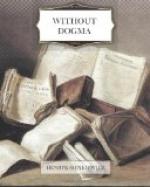PUBLISHER’S PREFACE
In “Without dogma” we have a remarkable work, by a writer known only in this country through his historical novels; and a few words concerning this novel and its author may not be without interest.
Readers of Henryk Sienkiewicz in America, who have known him only through Mr. Curtin’s fine, strong translations, will be surprised to meet with a production so unlike “Fire and Sword,” and “The Deluge,” that on first reading one can scarcely believe it to be from the pen of the great novelist.
“Fire and Sword,” “The Deluge,” and “Pan Michael” (now in press) form, so to speak, a Polish trilogy. They are, first and last, Polish in sentiment, nationality, and patriotism. What Wagner did for Germany in music, what Dumas did for France, and Scott for all English-speaking people, the great Pole has achieved for his own country in literature. Even to those most unfamiliar with her history, it grows life-like and real as it speaks to us from the pages of these historical romances. Only a very great genius can unearth the dusty chronicles of past centuries, and make its men and women live and breathe, and speak to us. These historical characters are not mere shadows, puppets, or nullities, but very real men and women, our own flesh and blood.
His warriors fight, love, hate; they embrace each other; they laugh; they weep in each other’s arms; give each other sage counsels, with a truly Homeric simplicity. They are deep-versed in stratagems of love and war, these Poles of the seventeenth century! They have their Nestor, their Agamemnon, their great Achilles sulking in his tent. Oddly enough, at times they grow very familiar to us, and in spite of their Polish titles and faces, and a certain tenderness of nature that is almost feminine, they seem to have good, stout, Saxon stuff in them. Especially where the illustrious knights recount their heroic deeds there is a Falstaffian strut in their performance, and there runs riot a Falstaffian imagination truly sublime.
Yet, be it observed, however much in all this is suggestive of the literature of other races and ages, these characters never cease for a moment to be Poles. Here is a vast, moving panorama spread before us; across it pass mighty armies; hetman and banneret go by; the scene is full of stir, life, action. It is constantly changing, so that at times we are almost bewildered, attempting to follow the quick succession of events. We are transported in a moment from the din and uproar of a beleaguered town to the awful solitude of the vast steppes,—yet it is always the Polish Commonwealth that the novelist paints for us, and beneath every other music rises the wild Slavic music, rude, rhythmical, and sad.




